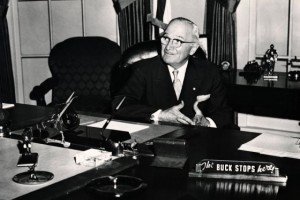I just read this article by New York Times best selling author Orrin Woodward.
Hope You Enjoy, Scott Johnson
American Politics: The Buck Stops Over There
Here is an article that Oliver DeMille and I wrote on the American Political scene. In contrast to the political method of passing the buck, LIFE Leadership teaches people to accept personal responsibility. For leadership is only possible when a person accepts responsibility. With few exceptions, the Republicans and Democrats are too focused on party, promotion and popularity to lead anyone anymore. This must change. Indeed, when a person chooses to be part of the solution, and not part of the problem, he is on his way to leading change.
Sincerely,
Orrin Woodward
The Buck Stops Over There by Orrin Woodward and Oliver DeMille
Harry Truman: The Buck Stops Here
President Obama’s handling of the recent scandals reveals a lot about his leadership. One of the first principles of leadership is to take responsibility– something the President has proven loathe to do. Where Harry Truman is said to have put a small sign on his desk that read “The Buck Stops Here,” the current administration prefers to point fingers elsewhere.
Yet the number of scandals continues to increase. At first, Fast and Furious seemed to be an isolated scandal, a reminder that Washington bears watching and that free societies require the vigilance of the media and citizenry. As Fast and Furious heated up in the media and on Capitol Hill, the White House deflected questions to other agencies—as if these agencies don’t report directly to the Oval Office.
This became a pattern when the IRS and Benghazi scandals dominated the news for a week, with the President and his closest advisers firing a top official (who was slated to retire anyway and wasn't asked to leave for a couple of weeks) and casting blame on others. The agencies were at fault, the White House assured us, not the President. In fact, according to this narrative, the President was the great solution to these scandals.
Then came more scandals, and this leadership pattern deepened. Deflect blame. Act like the President is the solution, not part of the problem. Promise to clean house. Talk tough. Don’t apologize. Don’t take responsibility. Blame terrorism. Send out aides to argue technicalities. Point fingers at executive agencies, never at the Executive.
This was the Obama Administration’s response to the AP scandal, the military sex scandal, the PRISM scandal, and the revelation that the government is collecting and storing people’s emails and phone records.
The military sex scandal is particularly illuminating. The crux of the problem lies in the military’s policy of allowing direct commanders to determine how to handle allegations of ** assault. This is a clear conflict of interest, since the commanders central mission is to win in battle. Charging soldiers with crimes removes them from their duties and weakens the commanders’ fighting force. As a result, many commanders prefer to sweep things under rug wherever possible.
The Administration seems to fancy the same approach. If an agency under its leadership abuses power, the White House is prone to make excuses, redirect blame, and act as if this was an isolated act by a rogue official. But the President and his top team are responsible for setting the tone and culture of the agencies.
Even Chris Matthews has been critical of the President’s refusal to take responsibility for executive agencies, and the The New York Times Editorial Board wrote that the President has lost all credibility on how he’s handled these scandals.
Other presidential administrations have behaved in a similar way, from missing WMDs to political targeting of state attorneys general under the Bush Administration. The executive branch must be closely watched in any free society, and administrations that pursue a policy of redirecting blame to lower agencies.
Other presidential administrations have behaved in a similar way, from missing WMDs to political targeting of state attorneys general under the Bush Administration. The executive branch must be closely watched in any free society, and administrations that pursue a policy of redirecting blame to lower agencies.
Ironically, the concern is even higher for an administration whose overall policy approach has been to increase America’s trust in government and desire for more government programs. The Five Laws of Decline are at play, and one of them, the Law of Diminishing Returns, has made it so no one person can oversee government anymore. For every scandal that gets exposed, there are others brewing.
If the President is right and the Oval Office can no longer keep tabs on the executive branch, this is a national emergency. On the current scale, it’s practically Watergate every month. If we elect a president to oversee the government, yet he protests he can’t, something is deeply, structurally wrong. If nobody can seem to find “The Buck,” Leviathan is looming.



 Twitter
Twitter Digg
Digg Facebook
Facebook Report this page
Report this page